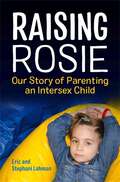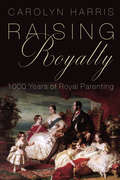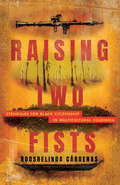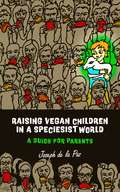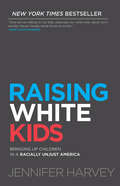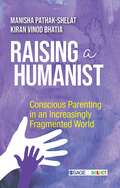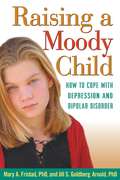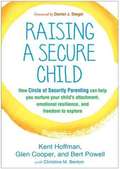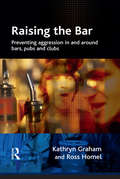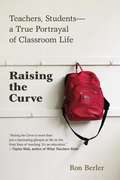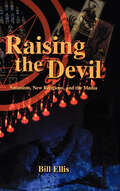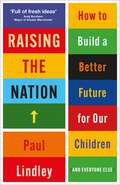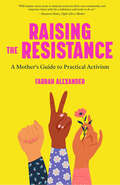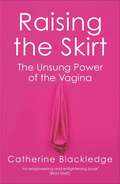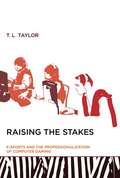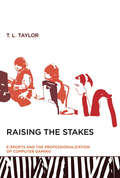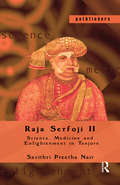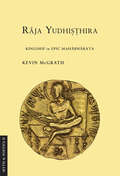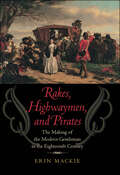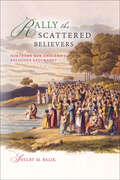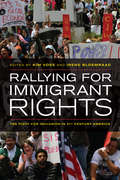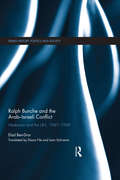- Table View
- List View
Raising Rosie: Our Story of Parenting an Intersex Child
by Georgiann Davis Stephani Lohman Eric LohmanWhen their daughter Rosie was born, Eric and Stephani Lohman found themselves thrust into a situation they were not prepared for. Born intersex - a term that describes people who are born with a variety of physical characteristics that do not fit neatly into traditional conceptions about male and female bodies - Rosie's parents were pressured to consent to normalizing surgery on Rosie, without being offered any alternatives despite their concerns. <P><P> Part memoir, part guidebook, this powerful book tells the authors' experience of refusing to have Rosie operated on and how they raised a child who is intersex. The book looks at how they spoke about the condition to friends and family, to Rosie's teachers and caregivers, and shows how they plan on explaining it to Rosie when she is older. This uplifting and empowering story is a must read for all parents of intersex children.
Raising Royalty: 1000 Years of Royal Parenting
by Carolyn HarrisHow royal parents dealt with raising their children over the past thousand years, from keeping Vikings at bay to fending off paparazzi. William and Kate, the Duke and Duchess of Cambridge, are setting trends for millions of parents around the world. The upbringing of their children, Prince George and Princess Charlotte, is the focus of intense popular scrutiny. Royalty have always raised their children in the public eye and attracted praise or criticism according to parenting standards of their day. Royal parents have faced unique challenges and held unique privileges. In medieval times, raising an heir often meant raising a rival, and monarchs sometimes faced their grown children on the battlefield. Conversely, kings and queens who lost their thrones in wars or popular revolutions often found solace in time spent with their children. In modern times, royal duties and overseas tours have often separated young princes and princesses from their parents, a circumstance that is slowly changing with the current generation of royalty.
Raising Two Fists: Struggles for Black Citizenship in Multicultural Colombia
by Roosbelinda CárdenasRaising Two Fists is a historically grounded ethnography of Afro-Colombian political mobilization after the multicultural turn that swept Latin America in the 1990s, when states began to recognize and legally enshrine rights for Afro-descendants. Roosbelinda Cárdenas explores three major strategies that Afro-Colombians' developed in their struggles against racialized dispossession—the defense of culturally specific livelihoods through the creation of Black Territories; the demand for differential reparations for Afro-Colombian war victims; and the fight for inclusion in Colombia's peace negotiations and post-conflict rebuilding—illustrating how they engage in this work both as participants of organized political movements and in their everyday lives. Although rights-based claims to the state have become necessary and pragmatic tools in the intersecting struggles for racial, economic, and social justice, Cárdenas argues that they continue to be ineffective due to Colombia's entrenched colonial racial hierarchies. She shows that while Afro-Colombians pursue rights-based claims, they also forge African Diasporic solidarities and protect the flourishing of their lives outside of the frame of rights, and with or without the state's sanction—a "two-fisted" strategy for Black citizenship.
Raising Vegan Children in a Speciesist World: A Guide for Parents
by Joseph de la Paz"When you rock your baby, you truly hold the future of humanity in your hands." This book is a practical guide for parents who have embarked on the mission of raising their vegan children. It covers all different aspects involved, including: •how to start out on the right foot •how to overcome fears and doubts •how to tackle concerns around nutrition •how to explain veganism to children •how to deal with the difficult situations that may arise both in and outside of the home •useful resources
Raising White Kids: Bringing Up Children in a Racially Unjust America
by Jennifer HarveyThis New York Times best-selling book is a guide for families, educators, and communities to raise their children to be able and active anti-racist allies.With a foreword by Tim Wise, Raising White Kids is for families, churches, educators, and communities who want to equip their children to be active and able participants in a society that is becoming one of the most racially diverse in the world while remaining full of racial tensions. For white people who are committed to equity and justice, living in a nation that remains racially unjust and deeply segregated creates unique conundrums.These conundrums begin early in life and impact the racial development of white children in powerful ways. What can we do within our homes, communities and schools? Should we teach our children to be "colorblind"? Or, should we teach them to notice race? What roles do we want to equip them to play in addressing racism when they encounter it? What strategies will help our children learn to function well in a diverse nation?Talking about race means naming the reality of white privilege and hierarchy. How do we talk about race honestly, then, without making our children feel bad about being white? Most importantly, how do we do any of this in age-appropriate ways?While a great deal of public discussion exists in regard to the impact of race and racism on children of color, meaningful dialogue about and resources for understanding the impact of race on white children are woefully absent. Raising White Kids steps into that void."Most white Americans didn't get from our own families the concrete teaching and modeling we needed to be active in the work of racial justice ourselves, let alone to feel equipped now to talk about race with and teach anti-racism to our children. There is so much we need to learn and it's urgent that we do so. But the good news is: we can," says Jennifer Harvey.
Raising a Humanist: Conscious Parenting in an Increasingly Fragmented World
by Manisha Pathak- Shelat Kiran BhatiaThe world is immensely divided and broken. We have lost the art of having conversations with those who are different from us. While we cannot change the world, we can take small remedial steps starting with our homes and communities. The authors—communication scholars—with a vast experience of working with parents, teachers and youth engage you in a conversation that is bound to leave a lasting impression on you, your children, and our world. Using critical questions, pragmatic tips and interesting anecdotes, they touch upon the deep divisive issues of our society and provide fascinating ways to use art, technology and media to provide our children with a nurturing community. Bold and provocative at times, this empowering book is your companion in raising a humanist.
Raising a Moody Child
by Mary S. Arnold Mary A. FristadEvery day can be an ordeal for families struggling with the difficult, moody, "impossible" behavior that may point to childhood depression or bipolar disorder. Effective help for kids does exist, but it often requires a customized combination of medication, therapy, coping skills, and support. From esteemed clinician and researcher Dr. Mary Fristad and fellow treatment expert Dr. Jill Goldberg Arnold, this indispensable book explains how treatment works and what additional steps parents can take at home to help children with mood disorders--and the family as a whole--improve the quality of their lives. Explained are why symptoms look so different (and can be so much harder to manage) in children and teens than in adults, how to find the right doctor or therapist, and how to help kids develop their own "coping toolkits." Bursting with practical tools, FAQs, and examples, the book covers everything from dealing with medical crises to resolving school problems, sibling conflicts, and marital stress.
Raising a Secure Child: How Circle of Security Parenting Can Help You Nurture Your Child's Attachment, Emotional Resilience, and Freedom to Explore
by Christine M. Benton Daniel J. Siegel Glen Cooper Bert Powell Kent HoffmanToday's parents are constantly pressured to be perfect. But in striving to do everything right, we risk missing what children really need for lifelong emotional security. Now the simple, powerful "Circle of Security" parenting strategies that Kent Hoffman, Glen Cooper, and Bert Powell have taught thousands of families are available in self-help form for the first time. You will learn: *How to balance nurturing and protectiveness with promoting your child's independence. *What emotional needs a toddler or older child may be expressing through difficult behavior. *How your own upbringing affects your parenting style--and what you can do about it. Filled with vivid stories and unique practical tools, this book puts the keys to healthy attachment within everyone's reach--self-understanding, flexibility, and the willingness to make and learn from mistakes. Self-assessment checklists can be downloaded and printed for ease of use.
Raising the Bar (Crime Science Series)
by Ross Homel Kathryn GrahamThis book provides a definitive review of knowledge about bar room environments and their regulation, and provides directions for the prevention of aggression, violence and injury in and around public drinking establishments. It shows why drinking establishments are high risk for aggression, why some establishments are riskier than others, the effectiveness of existing interventions and policies, and the importance of better regulatory models for achieving safer drinking establishments. The authors emphasise the need to understand the problem and to tackle it through evidence-based preventive strategies, providing a detailed review of the nature of problem behaviours within the specific context of public drinking establishments - while recognising that these establishments are businesses that operate in diverse communities and cultures. Special attention is paid to the difficulties in implementing and sustaining effective interventions within the kinds of regulatory structures and political and economic climates that currently prevail in western countries. The book draws upon the authors' extensive experience with observational, interview and intervention research related to reducing aggression and injury in drinking establishments, as well as their knowledge of the alcohol field, and of prevention, policing and regulation more generally.
Raising the Curve
by Ron BerlerBrookside Elementary in Norwalk, Connecticut, is preparing for a new school year and another chance to improve its failing scores on the statewide standardized test known as the CMT. The challenges are many, and for the faculty--whose jobs may depend on their students' ability to improve on the test--the stakes are high. Ten-year-old Hydea is about to start fifth grade with second-grade reading skills. Her friend Marbella is only a little further along. In past years, these students would have received help from the literacy specialist Mrs. Schaefer. But this year, due to cutbacks and a change in job description, she will have to select the few students whom she and the teachers can bet on--the ones who are close to passing the exams. And, for added measure, Principal Hay has already asked his faculty to teach to the test. Journalist Ron Berler spent a full year at Brookside. In Raising the Curve, he offers a nuanced and personal portrait of the students, teachers, and staff who make up the Brookside community, capturing their struggles as well as their pride, resilience, and spirited faith.
Raising the Devil: Satanism, New Religions, and the Media
by Bill Ellis“Puts [the phenomena of Satanism] in the context of folklore and folk traditions . . . Highly recommended as a lucid and well-documented account.” —Library JournalRaising the Devil reveals how the Christian Pentecostal movement, right-wing conspiracy theories, and an opportunistic media turned grassroots folk traditions into the Satanism scare of the 1980s. During the mid-twentieth century, devil worship was seen as merely an isolated practice of medieval times. But by the early 1980s, many influential experts in clinical medicine and in law enforcement were proclaiming that satanic cults were widespread and dangerous. By examining the broader context for alleged “cult” activity, Bill Ellis demonstrates how the image of contemporary Satanism emerged. In some of the cases Ellis considers, common folk beliefs and rituals were misunderstood as evidence of devil worship. In others, narratives and rituals themselves were used to combat satanic forces. As the media found such stories attractive, any activity with even remotely occult overtones was demonized in order to fit a model of absolute good confronting evil.Ellis’s wide-ranging investigation covers ouija boards, cattle mutilation, graveyard desecration, and “diabolical medicine” —the psychiatric community’s version of exorcism. He offers a balanced view of contentious issues such as demonic possession, satanic ritual abuse, and the testimonies of confessing “ex-Satanists.” A trained folklorist, Ellis navigates a middle road, and his insights into informal religious traditions clarify how the image of Satanism both explained and created deviant behavior.“An interesting analysis of satanic folklore and organized anti-satanism in the US and UK.” —Choice“Shows how ancient bogeyman beliefs became aligned with politics and the criminal justice system to produce witch-hunts like the infamous McMartin Preschool case.” —Mother Jones
Raising the Nation: How to Build a Better Future for Our Children (and Everyone Else)
by Paul LindleyChildren today grow up in an increasingly volatile, complex and uncertain world. Theirs is a generation disempowered from steering their lives while society’s systems are failing to provide the support they need. Yet, a country only prospers when its children – from all walks of life – thrive, meaning that the United Kingdom now faces some consequential choices. Raising the Nation builds a compelling case showing why we must nurture smart, strong and kind children to one day inherit the stewardship of society. Setting out big public policy ideas, enhanced by contributions from academic and campaigning experts, as well as those with lived experience, including London Mayor Sadiq Khan, singer and activist Charlotte Church, and ex-prime minister of Denmark and former CEO of Save the Children International Helle Thorning-Schmidt, this book is a manifesto to deliver our brightest possible future. Reframing political success, it shows why we must prioritise child-centred policies to ensure the future strength of our communities, environment and economy.
Raising the Resistance: A Mother's Guide to Practical Activism
by Farrah AlexanderA sensible guide for mothers looking to incorporate activism in their parenting to raise empathetic, politically aware children.Acknowledging the dual role of mother and citizen, Scary Mommy writer and mom Farrah Alexander provides empowerment and guidance for the modern progressive mother . . .Mothers are a force to be reckoned with. And after the Women’s March and midterm elections, moms have surely secured their spot in today’s feminist movement. But for those who aren’t ready to make a bid for the presidency, the way forward can seem daunting and unclear. Whether it’s correcting a misinformed family member about gender equality or running for political office, this bold and accessible primer presents active parents with different types of activism they can incorporate into their parenting, no matter how big or small.With practical guidance, political commentary, and inspiration, this feminist manifesto for moms tackles problems from political representation to sexual misconduct. It doesn’t just validate present-day feminist frustration, it also offers practical ways to channel it into solutions. Most importantly, it proves that by planting seeds of empathy and political awareness in their children, moms can raise their children to be change-makers. They can raise the resistance.Inside, learn:Self-care techniques for badass momsStrategies for becoming a role model in today’s feminist movementDifferent types of activism moms can use to take a stand, and more!Praise for Raising the Resistance“Will inspire every mom to demand action in their own community and empower them with the confidence and tools to do so.” —Shannon Watts, author of Fight Like a Mother
Raising the Skirt: The Unsung Power of the Vagina
by Catherine Blackledge'A meticulous guide not only to the vagina but to changing perceptions of womanhood' OBSERVER'An empowering and enlightening book' IRISH TIMESThe vagina is the ultimate symbol of female power. Sexual power, creative power and the power to prevent harm. For too long, though, the true extent of vaginal power has been ignored, hidden and misrepresented. Raising the skirt: the unsung power of the vagina reveals this revolutionary view of female genitalia and points the way to a new understanding of what it means to be female. An inspiration for millennia, the vagina is actually a muscular marvel of engineering - sensitive and strong, fluid and flexible. Far from being a passive vessel, female genitalia control the most important role of all: the survival of the species.Originally published as THE STORY OF V: OPENING PANDORA'S BOX
Raising the Skirt: The Unsung Power of the Vagina
by Catherine Blackledge'A meticulous guide not only to the vagina but to changing perceptions of womanhood' OBSERVER'An empowering and enlightening book' IRISH TIMESThe vagina is the ultimate symbol of female power. Sexual power, creative power and the power to prevent harm. For too long, though, the true extent of vaginal power has been ignored, hidden and misrepresented. Raising the skirt: the unsung power of the vagina reveals this revolutionary view of female genitalia and points the way to a new understanding of what it means to be female. An inspiration for millennia, the vagina is actually a muscular marvel of engineering - sensitive and strong, fluid and flexible. Far from being a passive vessel, female genitalia control the most important role of all: the survival of the species.Originally published as THE STORY OF V: OPENING PANDORA'S BOX
Raising the Stakes
by T. L. TaylorCompetitive video and computer game play is nothing new: the documentary King of Kong memorably portrays a Donkey Kong player's attempts to achieve the all-time highest score; the television show Starcade (1982--1984) featured competitions among arcade game players; and first-person shooter games of the 1990s became multiplayer through network play. A new development in the world of digital gaming, however, is the emergence of professional computer game play, complete with star players, team owners, tournaments, sponsorships, and spectators. In Raising the Stakes, T. L. Taylor explores the emerging scene of professional computer gaming and the accompanying efforts to make a sport out of this form of play. In the course of her explorations, Taylor travels to tournaments, including the World Cyber Games Grand Finals (which considers itself the computer gaming equivalent of the Olympics), and interviews participants from players to broadcasters. She examines pro-gaming, with its highly paid players, play-by-play broadcasts, and mass audience; discusses whether or not e-sports should even be considered sports; traces the player's path from amateur to professional (and how a hobby becomes work); and describes the importance of leagues, teams, agents, organizers, referees, sponsors, and fans in shaping the structure and culture of pro-gaming. Taylor connects professional computer gaming to broader issues: our notions of play, work, and sport; the nature of spectatorship; the influence of money on sports. And she examines the ongoing struggle over the gendered construction of play through the lens of male-dominated pro-gaming. Ultimately, the evolution of professional computer gaming illuminates the contemporary struggle to convert playful passions into serious play.
Raising the Stakes: E-Sports and the Professionalization of Computer Gaming
by T. L. TaylorHow a form of play becomes a sport: players, agents, referees, leagues, tournaments, sponsorships, and spectators, and the culture of professional computer game play.Competitive video and computer game play is nothing new: the documentary King of Kong memorably portrays a Donkey Kong player's attempts to achieve the all-time highest score; the television show Starcade (1982–1984) featured competitions among arcade game players; and first-person shooter games of the 1990s became multiplayer through network play. A new development in the world of digital gaming, however, is the emergence of professional computer game play, complete with star players, team owners, tournaments, sponsorships, and spectators. In Raising the Stakes, T. L. Taylor explores the emerging scene of professional computer gaming and the accompanying efforts to make a sport out of this form of play.In the course of her explorations, Taylor travels to tournaments, including the World Cyber Games Grand Finals (which considers itself the computer gaming equivalent of the Olympics), and interviews participants from players to broadcasters. She examines pro-gaming, with its highly paid players, play-by-play broadcasts, and mass audience; discusses whether or not e-sports should even be considered sports; traces the player's path from amateur to professional (and how a hobby becomes work); and describes the importance of leagues, teams, owners, organizers, referees, sponsors, and fans in shaping the structure and culture of pro-gaming.Taylor connects professional computer gaming to broader issues: our notions of play, work, and sport; the nature of spectatorship; the influence of money on sports. And she examines the ongoing struggle over the gendered construction of play through the lens of male-dominated pro-gaming. Ultimately, the evolution of professional computer gaming illuminates the contemporary struggle to convert playful passions into serious play.
Raja Serfoji II: Science, Medicine and Enlightenment in Tanjore (Pathfinders)
by Savithri Preetha NairIn the early nineteenth century, the south Indian kingdom of Tanjore, which had come under the control of the East India Company, flourished as a ‘centre’ of enlightenment. This book traces the contours of the Tanjore enlightenment, which produced a knowledge that was at once modern and deeply rooted in the indigenous tradition. The chief protagonist of this first ever full-length study on Tanjore at the turn of the nineteenth century is Raja Serfoji II (r. 1798–1832), in whose world science and God coexisted comfortably. Tanjore at this time was a thriving contact-zone, linked to several centres through extensive local and global networks. Its court attracted a great number of visitors, including Christian missionaries, high-ranking Company officials, princely contemporaries, naturalists, and medical practitioners. Dwelling on the locatedness of science and enlightenment modernity in the context of the colonial periphery, the book describes how the Raja deployed certain ‘vectors of assemblage’ — an array of practices, instruments, theories and people, including his vast collection of manuscripts, books and scientific instruments, a Devanagari printing press, a menagerie, health establishments and a large retinue of trained experts and artists — to invent Tanjore as a contemporary ‘centre’. Shunning reductionist and diffusionist explanations of the transmission of Western science in colonial settings, the study uses hitherto unexplored archival sources to reconstruct the Tanjore enlightenment as the outcome of globally situated cross-cultural exchanges. It celebrates the openness and confidence with which European science was engaged with, assimilated, translated and reinvented in a ‘contact-zone’ located in the colonial backwaters of south India. The book will be of interest to historians, sociologists and those interested in history of science and medicine, anthropologists, cultural studies scholars, as well as the general reader.
Raja Yudhisthira: Kingship in Epic Mahabharata (Myth and Poetics II)
by Kevin McGrathIn Raja Yudhisthira, Kevin McGrath brings his comprehensive literary, ethnographic, and analytical knowledge of the epic Mahabharata to bear on the representation of kingship in the poem. He shows how the preliterate Great Bharata song depicts both archaic and classical models of kingly and premonetary polity and how the king becomes a ruler who is viewed as ritually divine. Based on his precise and empirical close reading of the text, McGrath then addresses the idea of heroic religion in both antiquity and today; for bronze-age heroes still receive great devotional worship in modern India and communities continue to clash at the sites that have been—for millennia—associated with these epic figures; in fact, the word hero is in fact more of a religious than a martial term.One of the most important contributions of Raja Yudhisthira, and a subtext in McGrath's analysis of Yudhisthira's kingship, is the revelation that neither of the contesting moieties of the royal Hastinapura clan triumphs in the end, for it is the Yadava band of Krsna who achieve real victory. That is, it is the matriline and not the patriline that secures ultimate success: it is the kinship group of Krsna—the heroic figure who was to become the dominant Vaisnava icon of classical India—who benefits most from the terrible Bharata war.
Rajniti Sidhanth Ki Rooprekha: राजनीति-सिद्धांत की रूपरेखा
by Om Gaba"राजनीति-सिद्धांत की रूपरेखा' के सप्तम संस्करण के अंतर्गत जगह-जगह नए संशोधन-परिवर्धन किए गए हैं, और अद्यतन सामग्री का समावेश किया गया है। विवेच्य विषय के निरंतर विस्तारशील स्वरूप को। नए महत्त्वपूर्ण प्रकरण जोड़े गए हैं। 'विचारधारा की संकल्पना' के अंतर्गत 'नारीवाद' (Feminism) का संक्षिप्त परिचय जोड़ा गया है। 'राज्य का स्वरूप : विविध परिप्रेक्ष्य' के अंतर्गत दो नए, विस्तृत प्रकरण जोड़े गए हैं।
Rakes, Highwaymen, and Pirates: The Making of the Modern Gentleman in the Eighteenth Century
by Erin MackieErin Mackie explores the shared histories of the modern polite English gentleman and other less respectable but no less celebrated eighteenth-century masculine types: the rake, the highwayman, and the pirate.Mackie traces the emergence of these character types to the seventeenth and early eighteenth centuries, when traditional aristocratic authority was increasingly challenged. She argues that the development of the modern polite gentleman as a male archetype can only be fully comprehended when considered alongside figures of fallen nobility, which, although criminal, were also glamorous enough to reinforce the same ideological order.In Evelina’s Lord Orville, Clarissa’s Lovelace, Rookwood’s Dick Turpin, and Caleb Williams's Falkland, Mackie reads the story of the ideal gentleman alongside that of the outlaw, revealing the parallel lives of these seemingly contradictory characters. Synthesizing the histories of masculinity, manners, and radicalism, Rakes, Highwaymen, and Pirates offers a fresh perspective on the eighteenth-century aristocratic male.
Rakes, Highwaymen, and Pirates: The Making of the Modern Gentleman in the Eighteenth Century
by Erin MackieA study of the depiction and development of masculine figures in eighteenth-century British literature.Erin Mackie explores the shared histories of the modern polite English gentleman and other less respectable but no less celebrated eighteenth-century masculine types: the rake, the highwayman, and the pirate.Mackie traces the emergence of these character types to the seventeenth and early eighteenth centuries, when traditional aristocratic authority was increasingly challenged. She argues that the development of the modern polite gentleman as a male archetype can only be fully comprehended when considered alongside figures of fallen nobility, which, although criminal, were also glamorous enough to reinforce the same ideological order.In Evelina’s Lord Orville, Clarissa’s Lovelace, Rookwood’s Dick Turpin, and Caleb Williams's Falkland, Mackie reads the story of the ideal gentleman alongside that of the outlaw, revealing the parallel lives of these seemingly contradictory characters. Synthesizing the histories of masculinity, manners, and radicalism, Rakes, Highwaymen, and Pirates offers a fresh perspective on the eighteenth-century aristocratic male.“In this well-researched study, Mackie makes a strong case for the inclusion of alternative, criminal masculinities in understanding the development of the modern English gentleman and patriarchy in the eighteenth century. Situated at the nexus of gender theory and literary studies, her book adds to the study of modern and late modern cultural norms of gender and sexuality through discourse analysis of literary and nonliterary texts.” —Srividhya Swaminathan, Journal of British Studies“The topic is lively, the writing clear, and the argument persuasive. Bringing together histories of criminality, of gender, and of manners cuts across the period in a new way that promises to produce lively debate.” —James Thompson, University of North Carolina at Chapel Hill“The central concern of this book is the transformation of the “British gentleman” from the so-called Glorious Revolution through reformulations of patriarchy as exhibited in taste, sensibility, and virtue in the 18th century and beyond.” —Choice
Rally the Scattered Believers: Northern New England's Religious Geography
by Shelby M. Balik“An important new interpretation of how religious change shaped American cultural identity in the early republic.” —Journal of American HistoryNorthern New England, a rugged landscape dotted with transient settlements, posed challenges to the traditional town church in the wake of the American Revolution. Using the methods of spatial geography, Shelby M. Balik examines how migrants adapted their understanding of religious community and spiritual space to survive in the harsh physical surroundings of the region. The notions of boundaries, place, and identity they developed became the basis for spreading New England’s deeply rooted spiritual culture, even as it opened the way to a new evangelical age.“I strongly recommend Balik’s book for those studying colonial religious landscapes and heritages not only in New England, but in the nineteenth-century religious diasporas that swept the continent with varying mixes of European colonials and also African and Asian heritages.” —Stanley D. Brunn, University of Kentucky“In this beautifully written and richly researched work, Shelby Balik shows how the travels of early nineteenth century Methodists, Universalists and freewill Baptist itinerant missionaries and congregations recreated the geography of New England Protestantism, setting in motion (literally) a tension between religious rootedness and religious uprootedness, center and periphery, that endures to today. Early American religious history in Balik’s retelling of it is one of bodies in constant movement in and out and around the city on the hill. The delight Balik takes in maps and journeys is infectious. This is a wonderful addition to American religious historiography.” —Robert Orsi, Northwestern University
Rallying for Immigrant Rights
by Kim Voss Irene BloemraadFrom Alaska to Florida, millions of immigrants and their supporters took to the streets across the United States to rally for immigrant rights in the spring of 2006. The scope and size of their protests, rallies, and boycotts made these the most significant events of political activism in the United States since the 1960s. This accessibly written volume offers the first comprehensive analysis of this historic moment. Perfect for students and general readers, its essays, written by a multidisciplinary group of scholars and grassroots organizers, trace the evolution and legacy of the 2006 protest movement in engaging, theoretically informed discussions. The contributors cover topics including unions, churches, the media, immigrant organizations, and immigrant politics. Today, one in eight U.S. residents was born outside the country, but for many, lack of citizenship makes political voice through the ballot box impossible. This book helps us better understand how immigrants are making their voices heard in other ways.
Ralph Bunche and the Arab-Israeli Conflict: Mediation and the UN, 1947-1949 (Israeli History, Politics and Society)
by Elad Ben-Dror"I swear by all that’s Holy, I will never come anywhere near the Palestine problem once I liberate myself from this trap." Ralph Bunche wrote these lines to his wife in 1949, during the armistice talks on Rhodes. A year later, he was awarded the Nobel Peace Prize for his success in ending the 1948 Arab-Israeli war. Ralph Bunche and the Arab-Israeli Conflict provides a comprehensive study of Ralph Bunche’s diplomatic activities on the Palestine question. Bunche was at the centre of the story from the referral of the issue to the United Nations in 1947 until the signing of the armistice agreements that ended the war. He began as advisor to UNSCOP and then headed the secretariat of the commission tasked with implementing partition. Later, after serving as the senior aide to UN mediator Folke Bernadotte, he was appointed to replace the Count after the latter’s assassination. Using extensive archival materials (some of it revealed here for the first time), this book addresses central questions, such as the relationship between Bunche’s African American identity and his diplomatic endeavours, and the complexities of his outlook on the Arab-Israeli conflict. Through research and careful analysis, it uncovers how Ralph Bunche managed to bridge the gaps between Israel and Arab states. This book will be of interest to students and scholars of Middle Eastern History, particularly Israeli History, as well as Political Science and Diplomacy.
